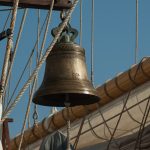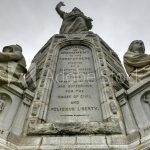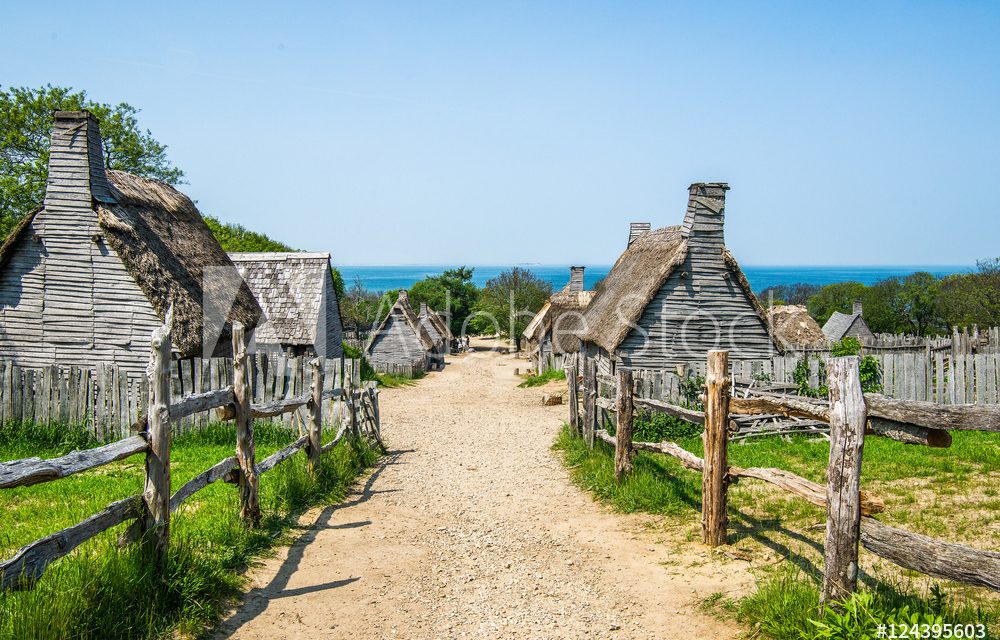THIS YEAR IN HISTORY
The Pilgrims needed two things to immigrate to America: funding and a charter (permission) to start an English colony. Charters came from the Virginia Company of London, a corporation tasked by the Crown to support the settlement of colonies in the New World. At this point in time, the Virginia Company was on the brink of failure. They could no longer fully fund the settlement, but they obtained a partial grant from the Crown (although somewhat reluctant to fund religious dissidents). Additional financing had to be found elsewhere. It came at a high cost to the Pilgrims.
A BIG RISK AND A HARD BARGAIN
The Pilgrims explicitly instructed their representatives, John Carver and Robert Cushman, to not “entangle yourselves and us in any such unreasonable [conditions, such as that] the merchants should have the half of men’s houses and lands at the dividend.” But London’s investors knew very well that New World ventures were high-risk.

The Merchant Adventurers of London, led by iron merchant Thomas Weston, agreed to finance a loan with a promise of interest, 50% share of the profits, and 50% of all assets at the end of seven years. In hopes of safeguarding their returns, they stipulated that during those seven years, the Pilgrims were to live communally, keeping all resources in a “common store” to disburse equally to the members.
Having already sold their property in Holland, the Pilgrims reluctantly agreed to the terms. When they arrived in the New World, they established their own form of government—a self-governing republic—but their economy abided and operated under the bylaws established by the Virginia Company of London. Devastated by illness before their settlement could be established, their first full year in the New World (1621) would add economic problems to their hardships.
THE FREE-RIDER PROBLEM
 Issues arose almost immediately. Hard workers felt exploited by those who felt less need to work. Everyone could demand an equal share of goods from the common storehouse. The result was resentment, ongoing conflict, and ultimately refusal to work. This was compounded when an additional 35 colonists were sent by the investors on the second ship, Fortune, who brought little food or clothing.
Issues arose almost immediately. Hard workers felt exploited by those who felt less need to work. Everyone could demand an equal share of goods from the common storehouse. The result was resentment, ongoing conflict, and ultimately refusal to work. This was compounded when an additional 35 colonists were sent by the investors on the second ship, Fortune, who brought little food or clothing.
Governor William Bradford reported in his journal that there was constant thievery of the storehouse, corn and vegetables were not cultivated or were left to rot, and able-bodied men feigned sickness. Men and women refused to work in what they viewed as an unjust system. Economic failures and physical hardships brought famine and ultimately the plague of 1623.
Under communal land stewardship, the community was afflicted by an unwillingness to work, by confusion and discontent, by a loss of mutual respect, and by a prevailing sense of slavery and injustice. —The Hoover Institute
Anger and resentment grew among those who did the lion’s share of the work, so they be came less willing to work. As a result, the colony could not produce enough food to feed everyone. This is a common problem with socialism everywhere it has been implemented. —Carole Hornsby Haynes, Ph.D., Columnist for EducationViews.org
MEN ARE NOT SMARTER THAN GOD
Governor Bradford described the communal system as a failure. He further wrote that even though it was attempted by good and honest men, not only did it fail, but it brought out the worst in them. He concluded it was a mistake to believe:
… that the taking away of property and the possession of it in community, by a commonwealth, would make them happy and flourishing; as if they were wiser than God. For this community (so far as it was) was found to breed much confusion and discontent and retard much employment that would have been to their benefit and comfort. … The strong, or man of parts, had no more division of victuals and clothes than he that was weak and not able to do a quarter than the other could; this was thought injustice. The aged and graver men to be ranked and equalized in labours, victuals, clothes, etc., with the meaner and younger sort, thought it some indignity and disrespect unto them. And for men’s wives to be commanded to do service for other men, as dressing their meat, washing their clothes, etc., they deemed it a kind of slavery. (Excerpt from Governor Bradford’s Journal)

On the brink of extinction from starvation and sickness, and with the advice of the colony leaders, Bradford assigned each family their own plot according to their size. He reported that once they were given ownership, men who had feigned illness were suddenly out in the fields working. Women, who viewed the communal chores as slavery, were satisfied to work for their own families. Immediately the economy began to improve. Property in Plymouth was further privatized in the years ahead. Their debt was fully repaid in 1648. ✤
Facts and Epilogue
- The economy of Plymouth Colony was based on agriculture, fishing, whaling, timber and fur.
- The Plymouth Company investors initially invested about £1200 to £1600 in the colony before the Mayflower even sailed.
- The colonists had to pay this money back over seven years by harvesting supplies and shipping them back to the investors in England to be sold.
- Each investor in the Plymouth Company was issued shares worth £10 and each adult colonist received one share and were given options to purchase more shares later on. For the first seven years, everything was to remain in the “common stock” which was owned by all the shareholders.”
- In 1627, the Plymouth Company investors were unhappy with the lack of return they saw from the colony and the colonists agreed to buy them out for £1800, which was to be paid in installments of 200 pounds a year over nine years.
- Eight colonists pledged their personal credit to buy the investor’s shares. These colonists were William Bradford, John Howland, Myles Standish, Isaac Allerton, Edward Winslow, William Brewster, John Alden and Thomas Prence.
- It took much longer than nine years to pay back the money and the pilgrims didn’t finish paying it off until over 20 years later in 1648.”
- The fur trade industry was the colony’s economic salvation. For the first few years that the colony existed, the colonists struggled to make enough money to pay the investors back. In fact, they had to ask for more money just to keep the colony running and by the mid to late 1620s, they were deeply in debt to the investors.
- To help pay down the debt they still owed, the colonists established a beaver fur trading base in Kennebec, Maine by 1625. Beavers were plentiful in Maine where the local Native-Americans tribe had hunted them for generations.”
- The Plymouth Colony was eventually absorbed into the Massachusetts Bay Colony.










